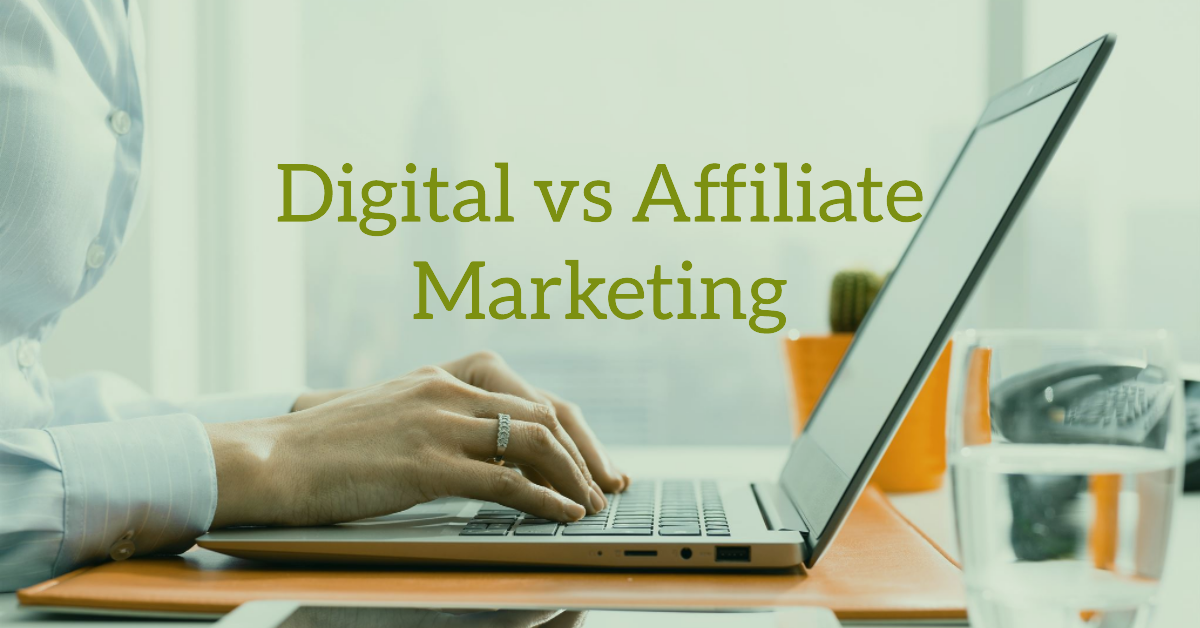Introduction
In the ever-evolving landscape of online business, two prominent strategies stand out: Digital Marketing and Affiliate Marketing. Both play crucial roles in promoting products and services, but they differ in their approaches and mechanisms. This article aims to delve into the intricacies of Digital Marketing and Affiliate Marketing, comparing their strengths, weaknesses, and applications in the contemporary business environment.
I. Digital Marketing: A Comprehensive Overview
Digital Marketing encompasses a broad spectrum of online promotional activities aimed at reaching and engaging with a target audience. It entails connecting with potential customers through digital means such as search engines, social media, email, and websites.to connect with potential customers. The primary goal is to create brand awareness, drive traffic, and ultimately convert leads into customers.
Search Engine Optimization (SEO)
Search Engine Optimization (SEO) is a vital pillar of Digital Marketing. SEO involves optimizing online content to improve its visibility on search engine result pages (SERPs). By strategically incorporating relevant keywords, creating high-quality content, and building backlinks, businesses can enhance their online presence and attract organic traffic.
Social Media Marketing (SMM)
Another important aspect of digital marketing is social media marketing.. Platforms like Facebook, Instagram, Twitter, and LinkedIn provide powerful tools for businesses to connect with their target audience. Through targeted advertising, engaging content, and community building, companies can foster brand loyalty and generate leads.
Pay-Per-Click (PPC) Advertising
PPC advertising is a paid advertising model where businesses pay a fee each time their ad is clicked. Google Ads is a popular platform for PPC advertising, allowing businesses to bid on keywords relevant to their products or services. This method provides instant visibility and can be highly effective for driving targeted traffic.
Email Marketing
Email Marketing remains a potent tool for nurturing leads and maintaining customer relationships. By delivering personalized and relevant content directly to the inbox, businesses can keep their audience informed, promote products, and encourage repeat business.
II. Affiliate Marketing: Unleashing the Power of Partnerships
Affiliate Marketing operates on a different premise, focusing on partnerships to drive sales and generate revenue. In this model, businesses collaborate with affiliates who promote their products or services in exchange for a commission. It’s a performance-based marketing strategy that relies on the affiliate’s ability to drive conversions.
Affiliate Programs and Networks
Affiliate programs are central to this marketing model. Businesses create programs that allow individuals or other businesses (affiliates) to promote their products. Affiliate networks act as intermediaries, connecting businesses with potential affiliates and facilitating tracking, reporting, and payments.
Performance-Based Compensation
One of the distinguishing features of Affiliate Marketing is its performance-based compensation structure. Affiliates earn a commission only when their promotional efforts result in a desired action, such as a sale or lead. This aligns the interests of the business and the affiliate, as both parties benefit from successful conversions.
Diverse Marketing Channels
Affiliate Marketing is versatile in its approach, utilizing various channels for promotion. Affiliates can leverage blogs, social media, email marketing, and other online platforms to reach their audience. This diversity allows businesses to tap into different markets and demographics.
III. Digital Marketing vs. Affiliate Marketing: A Comparative Analysis
Now that we’ve explored the individual components of Digital Marketing and Affiliate Marketing, let’s compare these two strategies based on several key factors.
Cost-Effectiveness
Digital Marketing, particularly organic methods like SEO and social media, can be cost-effective over the long term. Once content is optimized and social media channels are established, businesses can continue to benefit from organic reach. On the other hand, Affiliate Marketing often requires an initial investment to set up the program and compensate affiliates.
Control and Flexibility
Digital Marketing provides businesses with greater control over their campaigns. They can dictate the messaging, target audience, and channels used. In contrast, Affiliate Marketing relies on the actions of independent affiliates. While this can lead to a broader reach, it also means less control over how the brand is represented.
Risk and Reward
Affiliate Marketing shifts much of the risk to the affiliates, as businesses only pay for actual conversions. This performance-based model can be advantageous for businesses, but it also means that results depend on the effectiveness of affiliates’ marketing efforts. Digital Marketing carries its own risks, such as changes in search engine algorithms affecting organic visibility or the unpredictability of social media algorithms.
Scale and Reach
Digital Marketing has a broader reach, allowing businesses to connect with a global audience through various online channels. Affiliate Marketing, while effective, may have a more limited reach depending on the size and reach of the affiliate network. However, affiliates can still tap into niche markets and audiences that businesses might struggle to reach directly.
IV. Synergies Between Digital Marketing and Affiliate Marketing
Rather than viewing Digital Marketing and Affiliate Marketing as mutually exclusive, businesses can benefit from integrating these strategies. The synergies between the two can amplify their impact, creating a more comprehensive and effective marketing approach.
Integrated Campaigns
Combining Digital Marketing and Affiliate Marketing enables businesses to create integrated campaigns that leverage the strengths of both strategies. For example, a company can use Digital Marketing to build brand awareness and drive initial traffic, while affiliates focus on converting those visitors into customers.
Cross-Promotion
Digital Marketing channels can be utilized to cross-promote affiliate partnerships. Social media, email marketing, and content marketing efforts can highlight affiliate collaborations, introducing the audience to trusted partners and potentially driving more affiliate-generated conversions.
Shared Analytics and Insights
By integrating analytics tools, businesses can gain a holistic view of their marketing performance. This shared data allows for a more comprehensive understanding of customer behavior, enabling businesses to optimize both Digital Marketing and Affiliate Marketing strategies based on real-time insights.
Conclusion
In the dynamic landscape of online marketing, both Digital Marketing and Affiliate Marketing play crucial roles in promoting products and services. While Digital Marketing encompasses a wide range of strategies aimed at building brand awareness and driving traffic, Affiliate Marketing leverages partnerships to generate sales and revenue on a performance basis.





